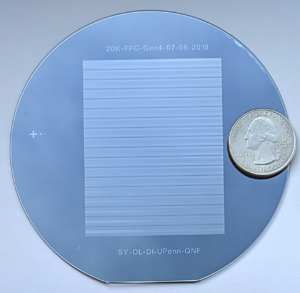The development of multiple effective vaccines against the SARS-CoV-2 virus in a matter of months was an unprecedented scientific achievement. Yet the distribution of these medical game changers could only proceed as quickly as they could be manufactured in a limited number of facilities. Certain countries and regions waited months to get a supply, dependent on other nations to send them the products.

To Daeyeon Lee and colleagues in the School of Engineering and Applied Science, this obstacle in the supply chain is an engineering problem. In response to a call from the National Science Foundation (NSF) through the Emerging Frontiers in Research and Innovation Program, Lee and others developed a proposal to create a series of hubs where mRNA vaccines could be efficiently manufactured and distributed.
“The call for proposals was looking for ideas in the area of distributing manufacturing of chemicals,” says Lee, a professor and the Evan C. Thompson Term Chair for Excellence in Teaching in the Department of Chemical and Biomolecular Engineering. “When that call came, a bunch of us here at Penn and other institutions thought, Why don’t we apply that idea of distributed manufacturing to the mRNA vaccine?”
Prior to the pandemic, Lee had been working on a system involving simultaneous reaction and separation of different chemicals from reactions, which he could translate to how mRNA molecules are produced. “The idea is, How do we make manufacturing more robust so it can be done in more places?”
Lee, together with collaborator Kathleen Stebe from Penn Engineering and colleagues from the University of Oklahoma, the University of Colorado, and Drexel University, received the NSF grant. That support has led to other funding and opportunities, working in collaboration with Michael Mitchell and David Issadore from Penn Engineering, Penn Medicine’s Drew Weissman, and Infini Fluidics’ Sagar Yadvali to develop their on-demand manufacturing system.
Their vision is a network of research labs, each with the capacity to produce different mRNA therapeutics. The potential is great, as mRNA therapies are showing promise in addressing a host of diseases and disorders, from HIV infection to gene therapy.
“It’s like how the Singh Center, while relatively compact, nevertheless has the capability of fabricating sophisticated, high-tech devices,” Lee says. “We could have these small-scale pharmaceutical mRNA manufacturing centers that can be used during normal times for research purposes but switch over to pharmaceutical production as needed. It’s a way of democratizing the process.”
Read the rest of Kathrine Unger Baillie’s “From a pandemic, scientific insights poised to impact more than just COVID-19” at Penn Today.
